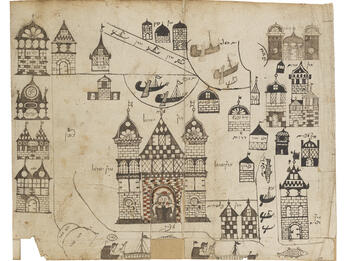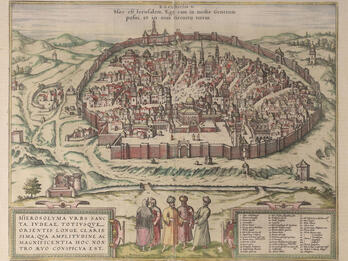Tsemaḥ David (The Sprout of David): Introduction to the Second Part
Nevertheless, I saw from the first that many people would open their mouths wide against me [see Psalms 22:14] and speak arrogantly against me and think it a sin on my part for my having written based on authors who are not from the children of Israel, and in addition, because my work, this second part of it, is written like tales of matters of war and other novel forms. [ . . . ]
Nevertheless, I will not go out of my way to apologize at length, for I have as protectors and shields many of the greatest Jewish authors who have already done so, all the divine philosophers, who from the books of Aristotle and other philosophers took those ideas that are correct and upright, eating the fruit and throwing away the peel [see b. ḥagigah 15b]. Also, near our own time, authors have told us new things about history in their books—R. Abraham Zacuto, in The Book of Genealogies, and R. Joseph ha-Kohen in his book, The Chronicle of the Kings of France and the House of Ottoman, and R. Abraham Farissol in his work, The Paths of the World, and others beside them. [ . . . ]
Furthermore, I maintain that Scripture permits us to seek out and interpret books written by gentiles for deeds and events that are of use to us. [ . . . ] Consequently, since many worthy people, whose souls longed and yearned to know history, urged me to inscribe it in a book, I have written this part of my book for a generation weary of exile, to bring joy to gloomy souls. [ . . . ]
I contend that much usefulness can come from the stories in this book. First, the tales of this book attest to the Providence of God, may His Name be blessed, over His flock. For although great and mighty kings have risen over other states and kingdoms, and destroyed them and eliminated them and uprooted them and made them extinct, until the memory of that nation is lost [see Psalms 83:5; 9:7], nevertheless, God—may He be praised and lauded—has protected us beneath His wings and has not given us as a prey to their teeth [see Psalms 124:6]. He has always kept His promise with us. [ . . . ] Many great and mighty wars resulted from a change in their beliefs, and not only those who denied their beliefs, but also those who merely changed their custom. For example, it is known that there is only a slight different between the Popish sect and the Lutheran sect, and yet it happened in the year 382 of the sixth millennium [1522], that simply for the reason of the change in their custom alone, more than a thousand thousand Christians were destroyed and killed and slaughtered in our time, from about fifty years ago until now, and with all that against the Children of Israel not even a dog whet its tongue (Exodus 11:7). Praised be the Lord who was wondrous in His kindness to us.
Second, let the living take note [see Ecclesiastes 7:2], that when a person rises to greatness and a high status, he should still remain humble and lowly in spirit and be solicitous of the people. He should not trust in his great authority and rule [ . . . ] and let him not despair because of persecutions, for even though there was never a government like the imperial government, even so more than fifty emperors have killed by the sword [the author gives additional examples of persecuted rulers], [ . . . ] as you will find written in this book with regard to each and every one of them.
Third, a person should be cautious and fearful of a small and lowly enemy as much as of a great and mighty enemy. He should pay attention to the example of emperors and kings who were killed or given a death potion by their lowly and contemptible enemies.
Fourth, a person should take from here an example and a lesson, not to fight with someone more powerful than himself, nor to provoke and oppose someone for whom the hour is propitious, as most of those who opposed great rulers ended up crushed by them.
Fifth, these stories attest to the Providence of God, may His Name be blessed, in that He repays the evildoer with harm, in accordance with his evil deeds, even in this world, as most of the cruel and wicked emperors and kings were killed and destroyed from the world.
Sixth, how many moral lessons will you find in the words of emperors? Such teachings are more acceptable and they will enter the ears of the masses, when they are told that such thing was done by a certain emperor, or that a particular saying came from the mouth of a certain emperor.
Seventh, these stories serve as proof for the timeliness of the sayings of our sages of sacred memory, as stated by the perfect saint, our rabbi and master Moses Isserles, in his commentary on Chapter 18 of Yesod ‘olam [Foundation of the World (1310), a scientific treatise by Isaac ben Joseph Israeli of Toledo]. [ . . . ]
Eighth, I saw fit to mention some of the heavenly signs, the new stars and eclipses, which appeared in some of the years and what happened and occurred after that. The purpose of these is to arouse the reader’s heart regarding the words of our sages of blessed memory in chapter two of Tractate Sukkah [29a] that when the sun or moon is eclipsed, this is a sign of evil in the world. [ . . . ] Therefore, if such a thing happens again, we should pray to God to spare us the evil indicated by this conjuncture, as it is in this regard that the sages of blessed memory wrote, “there is no constellation for Israel” [b. Shabbat 156a] and Rashi interprets this to mean that one’s astrological fate is changed on account of repentance. [ . . . ]
Ninth, we are among the nations and are sojourners and dwellers with them (Genesis 23:4), and yet if they tell or ask us about the early days of the ancient kingdoms, we put our hands over our mouth as we do not know what to answer, [ . . . ] by means of this book the respondent can answer and say a little bit about each and every era, and thereby we will find grace and good favor in their eyes [see Proverbs 3:4]. [ . . . ]
Tenth, [ . . . ] when the reader reads in this second part about the power and greatness of kings and emperors, whereas we in our exile have neither king nor governor, we will be stirred to pray to God to restore our judges as in former times and make the offspring of David flourish; may this be His will, Amen.
Translated by
.
Credits
David Ganz, Tsemaḥ David (The Sprout of David) (Prague, 1592). Republished as: David Ganz, Sefer Tsemaḥ David, ed. Mordechai Breuer (Jerusalem: Magnes Press, 1983), pp. 164–167.
Published in: The Posen Library of Jewish Culture and Civilization, vol. 5.




